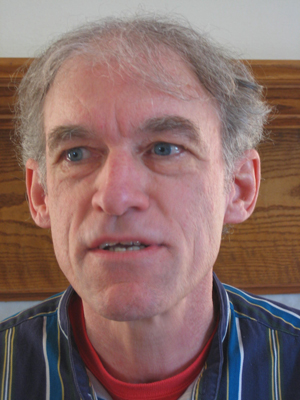
Write a bio.
I was born in Brooklyn, and grew up all over the
place--Germany (though I was only two and can't recall
it), Framingham, Massachusetts; Lincoln and Omaha,
Nebraska; Massapequa and Lynbrook, New York; Wayzata,
Minnesota. My father was a travelling salesman, so
our family was always on the move. One constant in my
life was a love of books. Rock music came along, and
my interest in song lyrics (Beatles, Doors, Jefferson
Airplane, etc.) made me want to try writing poetry.
I've attended poetry workshops with some great
teachers over the years--James Moore, Kate Green,
Michael Dennis Browne, Tom McGrath, Bill Tremblay,
Howard McCord. And I've been blessed with some dear
friends who've taught me more about poetry than I can
ever say. My wife, Jana, is also a great reader, and
a tough critic.
Describe the room you write in.
I write at a wooden table by a second-story window
looking out over the backyard. There's a huge maple
tree there, and in spring and summer, all you see is a
swaying wall of green. But I'm usually staring at the
computer screen--an old Mac--and playing around with
words to see what might happen if I try this or that.
Who are you reading now?
I'm reading "My Tired Father," by Gellu Naum,
translated from the Romanian by James Brook. The
book, a series of short prose lines, was made by the
author's cutting and combining sentences from many
different kinds of texts. I don't think I've ever
read anything quite like it. Here's an example:
"Ageless women gravitated around us The heads of some
of them emanated light" (There's no punctuation in the
book.)
Who are some of your favorite poets?
There are so many--Cesar Vallejo, Tom McGrath,
Muriel Rukeyser, Hilda Morley, Denise Levertov,
Kenneth Rexroth, Martin Espada.
What are you working on now?
I'm working on a poetry manuscript about my brother,
a stand-up comic who took his life in 1999. And I
have a collection of poems written in the persona of a
Chinese poet. The manuscript's completed but needs
final editing. I've also been gathering poems for an
anthology in homage to Thomas McGrath.
Talk about your book, "Terrestrial Music," just
published by Curbstone Press.
There's a theme that runs throughout the
collection--our connection to the earth. There are
poems of place, love poems, political poems. All
bring us back to where we live, how we live, and the
consequences of our actions and the actions of others
on us and this planet. But I'm making it sound very
abstract. These poems are not. They're often quite
simple and direct, with everyday experiences, such as
watching salt sizzle on icy front steps.
Other books you published include "Love-In-
Idleness: The Poetry of Roberto Zingarello," which
won the Washington Prize, "Learning to Glow: A
Nuclear Reader" (Univ. of Arizona), and you edited,
"Atomic Ghosts: Poets Respond to the Nuclear Age"
(Coffee House). Discuss the role your poetry has in this Nuclear age.
I think the Nuclear Age has a huge effect on all of
us, whether it's the psychological fear of living with
the possible destruction of the Earth, or the
radiation we all carry in our bodies from nuclear
tests that the US and other countries have conducted,
not to mention Chernobyl. I wonder what role nuclear
fallout has played in the cancer rate--something we'll
probably never know. The Bomb haunts many of my
poems--there's an entire section of "Terrestrial
Music" dealing with the Bomb and its offspring. I
think poetry offers a unique lens to see our obsession
with the atom. My hope is that these poems might
spark more interest in our nuclear history. Our
nuclear story really needs to be brought out of the
closet.
Personally, I am against all Nuclear
power/technology. This has caused some debate between
many of my friends and I. Do you find yourself facing
the same situation.
I rarely hear debate about nuclear power. Maybe
because I live in the state that has the most nuclear
reactors, and Illinoisians have grown accustomed to
it? A woman who was undergoing radiation therapy for
cancer told me something profound. She said radiation
had given her cancer, because she was living in Oak
Ridge, one of our nuclear sites. And radiation,
through radiation therapy, was saving her life. She
showed me how complex this topic is. But I don't see
how we can keep producing more nuclear waste when we
don't know what to do with it. And all this waste
provides a target for terrorists.
You currently teach at Northern Illinois University
in Dekalb, Illinois. What do you try to teach your
students about writing?
I hope I convey a love of reading and writing, the
sense of discovery writing can produce, the beauty of
language when crafted. I rarely bring poetry to my
composition classes as so many of my students hate and
fear it, though we've recently discussed some poems in
a reader we're using. "Richard Cory" is still timely
for my students, which surprised me.
What challenges do you face if any inside Academia?
The main challenge is getting students who've been
turned off to reading and writing to enjoy these
activities. And I'm always competing with the cell
phone, that constant presence in the classroom, no
matter how many times I ask that they be buried at the
bottom of the backpack. One colleague told me that
teachers need to see the cell phone as chewing gum in
the classroom--an irritant you just grow to live with.
I'm trying to get there, but I have a long way to go.

|

